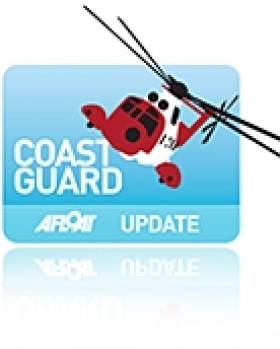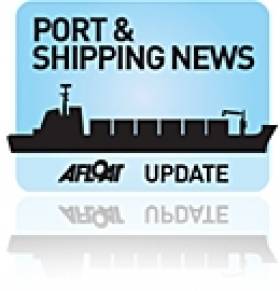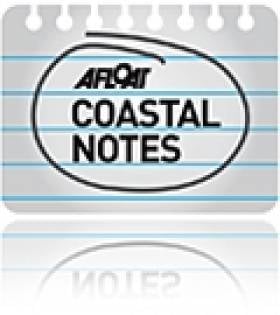Displaying items by tag: Scotland
Search Underway for Missing Ferry Passenger
The vessel had departed from Larne at 07.24 this morning and arrived at Cairnryan two hours later at a speed of approximately 18 knots. The master of the vessel has confirmed that one person is missing from the ships manifest.
The sea conditions are currently calm with a slight swell and good visibility with south westerly winds of 5 knots between the two locations.
A rescue helicopter, R 177, has been scrambled from the Royal Naval Air Station at Prestwick.
Clyde Coastguard are now organising a search throughout the area taking into account tidal drift and winds. Coastguard Rescue Teams have now been turned out ready to search the shores of Loch Ryan.
The Portpatrick, Stranraer and Larne RNLI lifeboats have all been requested to launch. A search has also begun from Cairnryan to Finnarts Bay. The Police Service of Northern Ireland has also been informed.
A mayday signal has now also been broadcast into the area by the Coastguard to alert passing shipping to the unfolding incident.
New Passenger-Only Ferry for Northern Ireland-Scotland Route
Plans to operate the first passenger-only ferry service between Northern Ireland and Scotland are scheduled to start in late May, writes Jehan Ashmore.
Kintyre Express is to operate a Ballycastle-Campbeltown service on Fridays, Saturdays and Sundays between 27 May and 26 September. Three daily return trips are scheduled on the service though the 1200hrs sailing from Campeltown and the corresponding 1400hrs sailing from Ballycastle will only operate on customer demand.
The passage time is scheduled to take approximately 1 hour 30 minutes between County Antrim and the Mull of Kintyre which is a distance of some 50 kilometres / 30-miles. Ticket fares for a single journey are £30 and the return is £55. On the remaining days that the route is not operated on, the boat is available for private charter.
In addition the new venture is to include an on-demand Campbeltown-Troon route running between April and September. This second service, linking Argyll with Ayrshire, will operate on Sundays, Wednesdays and Fridays. The journey time is somewhat shorter with a scheduled time of 1 hour 15 minutes. The on-demand service must be booked in advance with singles fares costing £50 and a return ticket at £80. For further information click www.kintyreexpress.com
Like the recent proposals announced for a passenger-only ferry service across Galway Bay click here, the Kintyre Express operation will also use a fast-ferry in the form of rigid inflatable boats (RIB). The two routes from Campeltown will be served by Redbay Stormforce 11 metre RIBS which have centrally heated fully enclosed cabins for about 10 passengers. The Redbay Boats are built in Cushendall, Co. Antrim, for further information about the type of RIB to be used on the new routes click here.
The Ballycastle-Campbeltown route will be unique in that it will be the sole passenger-only ferry operator serving between the island of Ireland and the UK.
When the second route opens between Campbeltown-Troon, the company will be able to provide their boat service linked in with a train journey to Glasgow which they claim can be completed in less than two hours. Trains between Troon and Glasgow Central Station operate every 30 minutes and with a journey time of approximately 40 minutes.
For those who are car-free and time-free, this most northerly of travel routes is arguably the most scenic way to travel between Northern Ireland and Scotland and will appeal also to the intrepid traveler.
On both ferry services bicycles are carried for free and currently there is a special offer with all ferry tickets that can also be used for a free-day pass on the local Kintyre bus network for up to 24-hours. The bus operator is Craig of Campbeltown which trades as West Coast Motors and which owns Kintyre Express. The bus operator also serves on routes throughout Argyll and the island of Bute.
The next nearest cross-channel operator to the Kintyre Express Ballycastle-Campbeltown service is the car-carrying catamaran fast-ferry seasonal service between Larne and Troon operated by P&O (Irish Sea). The same company operates the year-round conventional car-ferry service on the North Channel between Larne and Cairnryan. Also operating to Loch Ryan is Stena Line which operates both ferry and HSS fast-craft services on the Belfast-Stranraer route.
Over the years there have been several attempts to revive the ferry between Ballycastle and Campeltown following a service that catered for vehicles too. For three summer seasons starting in 1997 the service was operated by the Argyll and Antrim Steam Packet Company, using the Claymore (1978/1,632grt) which could accommodate 500 passengers and 50 vehicles.
In 1996 the vessel was chartered to carry out tender duties for visitors and crew of the aircraft-carrier USS John F. Kennedy (displacement 82,655 tons full load) which was at anchor off Dun Laoghaire Harbour.
Irish Sea Scallop Ban Raises Ire of Scots
Scottish fishermen have taken exception to a new ban on fishing for scallops in the Irish Sea around the Isle of Man.
Authorities on the island introduced the bylaw in reaction to what they perceive as dangerous levels of overfishing and are "keen to conserve and protect its scallop beds", according to The Guardian.
It has been claimed that so many undersized juveniles are fished by trawlers in the two-week season each November "that the population is being put at risk".
However, Scottish fisheries minister Richard Lochhead was quoted as describing the new measure as "unnecessary and unwarranted" and a "war" against Scots.
"There's been no scientific case to back up the bylaw that's been put in place, which blatantly just excludes Scottish vessels," he said.
Local Mooring Association Created to Manage Glenuig Bay Moorings
After community consultation in Scotland, brokered by The Crown Estate, agreement has been reached on the allocation of moorings in Glenuig Bay, on the Sound of Arisaig south of Mallaig.
The issue of moorings in the Bay had been contentious since Glenuig Inn Ltd. applied to position 10 moorings within the Bay. At a public meeting held in Glenuig Village Hall, on Thursday 30 September The Crown Estate and the local community came together to discuss a way forward. Through consultation with existing users an agreement was reached that will provide for most existing moorings to remain in place. Areas for commercial moorings have been set aside to be laid by Glenuig Inn Ltd. and Glenuig Community Association will act as a Moorings Association to manage the remaining moorings within both Glenuig Bay and Samalaman Bay. The new arrangements will allow the Glenuig Inn to expand its business into the leisure sailing market as well as the watersports market, and the local community to keep their boats in the Bay as they have for many years.
Alasdair Carmichael, Chair of the Glenuig Community Association said: "We are grateful to Paul Bancks of The Crown Estate and P.J. Korbel from their managing agents, Bidwells, for taking the time to meet with the various parties and to attend meetings in Glenuig Hall to enable these issues to be resolved. Without their help and patience it would not have been possible for these issues to be resolved to the satisfaction of all parties."
Paul Bancks, coastal manager for Scotland at The Crown Estate said: "This is an excellent example of our day-to-day management and facilitation that goes largely unnoticed, but which plays a vital role in managing the limited marine resource around Scotland's coast. We are delighted to be able to assist the local community at Glenuig and look forward to working with them in the future as they manage the local moorings resource for the benefit of the whole community."
Fishermen and boat owners have moored in Glenuig Bay in Moidart without consent for a number of years. Then, in 2008, the new owner of the Glenuig Inn applied to The Crown Estate and Scottish Government for 10 commercial moorings in the Bay to attract new business and provide facilities for visiting yachts.
The local community were very concerned that they would be 'evicted' from the Bay and would no longer be able to keep their boats close to their homes and businesses.
As owner of the seabed, The Crown Estate commissioned a survey in August 2010 to look at the optimum arrangement for moorings within the bay. The subsequent report, by local company Wallace Stone, identified a number of locations that would accommodate additional moorings and allow access to the important jetty and slipway in the Bay.
Last Chance For Scottish Series
With just over a week to go until the Brewin Dolphin Scottish Series sets sail, double Gold Olympic medalist Shirley Robertson, is calling on sailors from across the UK, and further a field, to sign up to this year’s event.
Shirley Robertson OBE, event ambassador, said: “The Brewin Dolphin Scottish Series is Scotland’s premier sailing regatta and I would encourage all enthusiasts to take up the challenge and be part of the successful event.
“Tarbert, Loch Fyne, is a fantastic location with perfect conditions for a challenging and exciting sailing experience. Scotland’s west coast has a lot to offer on the water but also shoreside socially, and I urge those thinking about entering the Scottish Series this year to do so as it’s a great weekend had by all who attend.”
Over 130 boats from across UK and beyond have already signed up, including previous competitors Fiona Hicks, Gery Trentesaux and Anthony O’Leary. As well as regular participants such as Chris Tiso on Thunderbird of Rhu and Boyd Tunnock on his boat Lemarac.
Event organiser, Jeremy Glen, said “A number of past competitors are returning again this year and we have a number of new boats on board which is testament to the success of the event.
“Sailors who sign up will experience an action packed weekend of sailing and shoreside activity in Tarbert where there is never a dull moment. It’s a fantastic way to spend the bank holiday weekend, so here’s hoping for some sunshine to top off the weekend experience.”
Expansion at Scotland's Oban Marina
With a total investment of £110,000 on the latest phase of developments at Oban Marina on the Isle of Kerrera, the marina is set for another successful season. Varis Engineering from Inverness supplied 24 new 12-metre finger pontoons that have been installed by Tobermory’s North West Marine in time for the influx of visiting boat owners this season.
Over the past five years, the owners of Oban Marina - who also hold in their business portfolio the highly acclaimed Nanny Cay Resort and Marina in Tortola, BVIs - have gradually upgraded and expanded their Scottish West Coast marina base which has seen an increase in visitors year-on-year. It has proved a popular stopover for international, south coast and local boat owners and this season will see the greatest number of visiting rallies and events hosted at Oban Marina – a great boost for the local economy.
The marina will host several new events as well as welcome back annual regattas including:
· The Three Peaks Yacht Race on 21st May
· The Festival of the Sea Open Day on 31st May (in association with the Scottish Association for Marine Science)
· The Great British RIB Rally on the 17th June
· The Clyde Cruising Club’s Centenary Dinner on 30th July
· West Highland Yachting Week on 1st August.
General Manager, Susan Deacon says: “This is a very exciting time for Oban Marina and it’s great that we are attracting such high profile events and regattas to the area. It’s good for everyone. Also, with 24 new 12m finger pontoons, we have the extra capacity and can now accommodate a total of 145 boats: up to 115 boats on pontoon berths and 30 on swinging moorings. We’ve also added three extra showers to help service the new berths and cut down on those summer queues. Last year a new water desalination unit was installed and this now provides plenty of water during the prime months.”
The provision of a much larger ferry for the Oban Marina to Oban shuttle service, allowed a greater numbers of visitors and marina/regatta guests to cross with ease to Oban throughout the season last year. Once again, the 63-person passenger service is running from 1st April through to the end of September 2010 and will be free for everyone on the Festival of the Sea Open Day on May 31st. The larger ferry proved a boost to visitor numbers to Kerrera, with many coming over for lunch at the popular Waypoint Grill & Bar.


































































